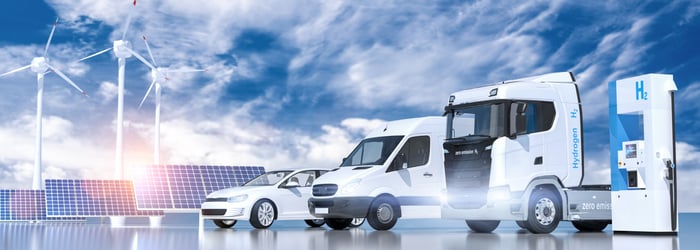Fuel cell maker Ballard Power Systems (BLDP -0.54%) stock fell nearly 20% after it reported its quarterly results last week. Investors surely had high expectations from the stock, which was getting valued at more than 80 times its sales in January. In fact, the company has set for itself a lofty target of 46% annual sales growth through 2030. Against this backdrop, a 26% year-over-year drop in first-quarter sales understandably upset investors. Let's see why Ballard Power's Q1 sales fell, and what can be expected from the company going forward.
Why Ballard's Q1 sales fell
Ballard Power reported revenue of $17.6 million in Q1, which was 26% lower than the year-ago quarter. The company's management cited three main reasons for the drop in revenue. First, last year's comparable quarter was strong due to a large shipment, as well as no impact of COVID-19. So, in comparison, the revenue looked low in the latest quarter. Second, the company's sales historically are tilted toward the second half of the year, while the first half is typically weak.

Image source: Getty Images.
The third reason, which I think is the most important, is that the policy pronouncements relating to hydrogen fuel cells in China had been slow in the last few quarters. China is Ballard Power's key market and accounted for 52% of its 2020 revenue. The company controls 45% of China's FCEV (fuel cell electric vehicle) market. It has a joint venture with China's Weichai Power, which also owns 15.5% of Ballard Power's outstanding shares. Indeed, slow development on the international policy front has impacted Ballard Power's sales growth in China.
This dynamic has long-term implications beyond the next few quarters. Advancements in battery technology could continue to impact hydrogen fuel cells' growth in the long term. In the absence of strong policy support, hydrogen fuel cells may not see the rapid growth that fuel cell companies are hoping for. Even though hydrogen fuel cell costs have fallen significantly over the years, they are still not competitive compared to other energy and storage options. So, they are dependent on government support and incentives to be financially viable -- not a great position to be in.
Is Ballard Power attractively valued now?
Ballard Power stock is 63% off its high price this year. Its market capitalization has fallen from more than $11 billion in February to $4.5 billion. Likewise, the stock's price-to-sales ratio has fallen from 98 in February to 40 now. Indeed, the stock's valuation has improved from what it was a couple of months back.

Image source: Getty Images.
Yet, even after the fall, a price-to-sales ratio of 40 looks outrageous for a company that has largely been unprofitable in more than 20 years of its operations. For perspective, the S&P 500 index's price-to-sales ratio right now is around 3. Companies with high growth rates tend to have higher ratios, but Ballard Power's looks too high considering the numerous risks that the company faces.
Conclusion
It's not that Ballard Power has no growth opportunities; hydrogen fuel cells are getting increasingly used in medium- and heavy-duty segments including buses, trucks, and rail. Ballard Power recently announced a partnership with Linamar (LIMAF 0.75%) to develop fuel cells for light-duty vehicles in Europe and North America.
There seems to be robust demand for hydrogen fuel cells in specific segments and geographies. However, profits remain elusive, and fuel cell companies may not manage to generate sustainable profits. The market for fuel cells needs to increase manyfold for fuel cell companies to become profitable. That doesn't seem to be happening right now.
In the absence of a rapidly growing market, those companies might be required to continue depending on government incentives to carry out their operations. Fuel cell companies haven't been profitable so far under the current policies and incentives across geographies.
Overall, considering the risks, Ballard stock's valuation doesn't look attractive even after its recent fall.




